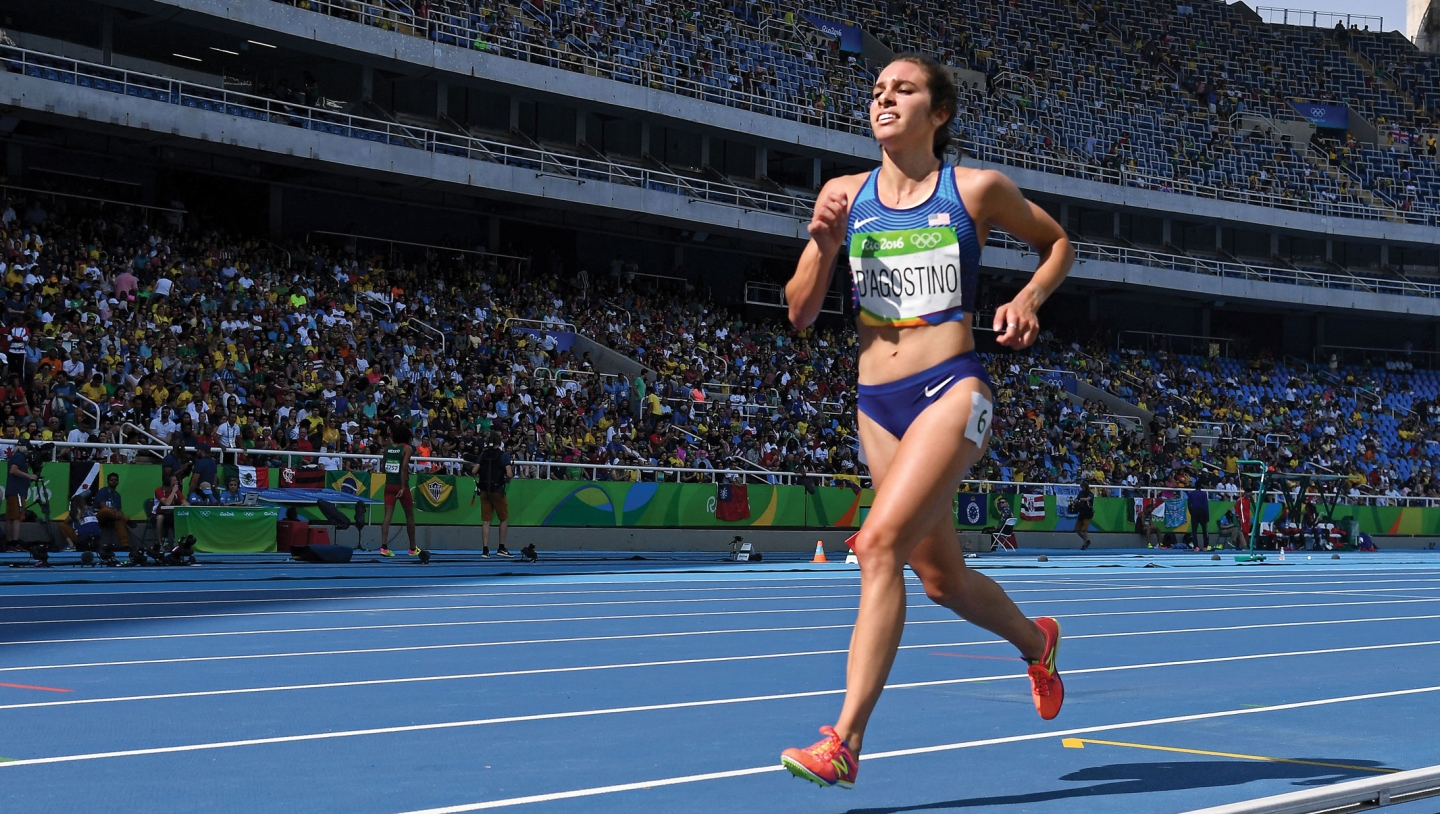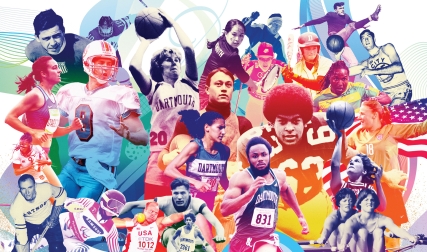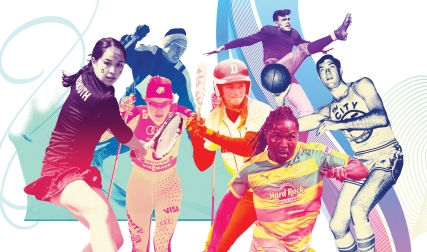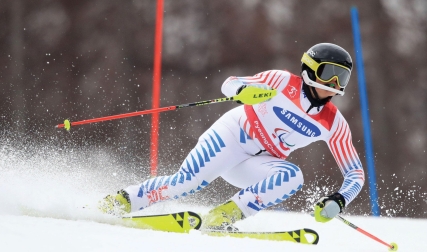ABBEY (D’AGOSTINO) COOPER ’14
Distance Runner
Olympian (2016)/winner of seven NCAA titles/three-time All-American/two-time Ivy Player of the Year/three-time Class of 1976 Award winner for most outstanding female varsity athlete
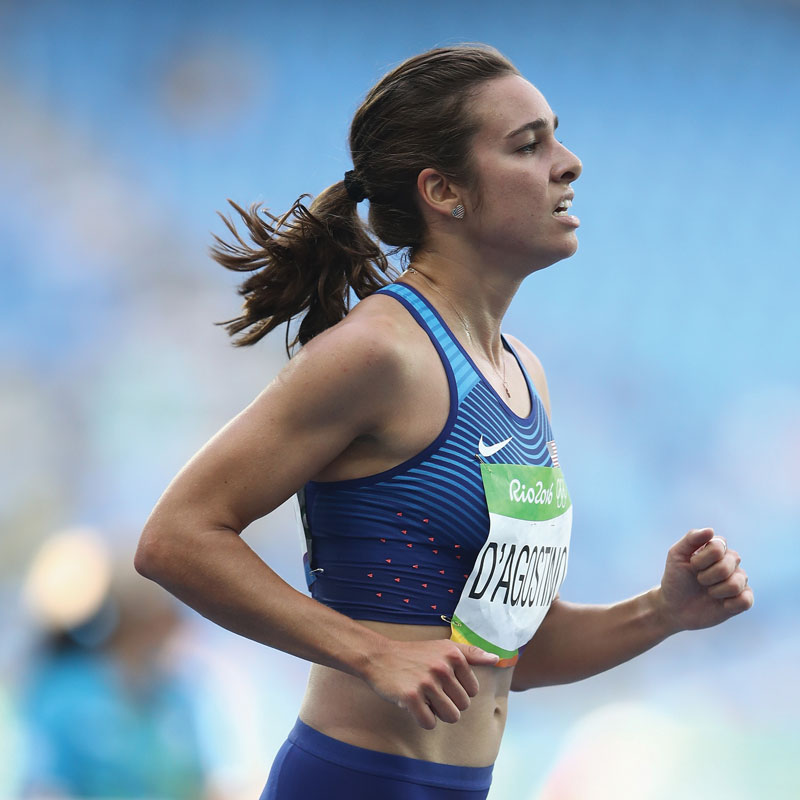
I First Knew I Was a Good Athlete: At the Olympic trials my sophomore summer. I ended up fifth in the final but missed making the team by less than a second. Having been so close really opened my eyes to the reality that I had some untapped potential.
Career Highlight: Rio 2016. It opened a ton of doors in terms of creating a platform to talk about things that really matter beyond sport.
Career Lowlight: Rio 2016. I tore my ACL and meniscus. I had to face the reality of missing an opportunity to perform at my best on the Olympic stage.
Best Coach: My Dartmouth coach, Mark Coogan, really stands out. He is an Olympian himself, and he just asked us to ask more of ourselves. He instilled in me so much confidence and self-belief.
Best Advice I Ever Got: Within athletics, there is this constant gravitational pull to self-centeredness, and I’m fighting it all the time. You’re put on a pedestal sometimes as a professional athlete. I’m just so thankful for the influences I have in my life encouraging me to nurture the other aspects of my identity.
How I Deal with Jitters: My husband is a sport psychologist, which is incredibly helpful. He’s taught me so much about guided visualizations of races, which has been instrumental to me in managing pre-race anxiety.
How I Deal with the Agony of Defeat: Leaning into relationships. My tendency—and I think this is the same for many athletes—is to withdraw and isolate when I’m disappointed, but the thing that I need most is relationships.
Pre-race Ritual: I usually write something that inspires me on a notecard or on my hand.
Superstitions: I wouldn’t say it’s a superstition as much as it is a routine: Peanut butter toast with a banana is my prerace meal. My husband says that you control routines, rituals control you. You don’t want it to have power over you, but routine is really healthy and good.
My Favorite Stat: I’m one of the only Ivy League athletes to win an individual NCAA championship.
Where I Keep My Awards: At my parents’ house. I have a few things from the Olympics in my workout room in our house.
Cooper, a psychology major, lives in Boone, North Carolina. She runs professionally for New Balance Athletics.
LEE STEMPNIAK ’05
Hockey Forward
NHL (2005-19)/member of U.S. national men’s hockey team (2007)/Alfred E. Watson Trophy winner for most outstanding male varsity athlete

Career Highlight: Scoring my first goal and my first hat trick in the NHL. Those are big things you dream about as a little kid, and to achieve them feels like you’re living out your dream.
Best Coach: Mike Kitchen, in St. Louis. He gave me a chance. He worked with me and taught me a lot of finer points in the game.
Best Advice I Ever Got: Kitchen told me that you’re not viewed as an NHL player by established players until you’ve played three seasons. It drove home the fact that you could do one year, but once everyone has figured out your game, can you still make it? You’ve got to put in the work, day after day, to be consistently successful.
Advice for Aspiring Athletes: You have to be passionate about it and have a growth mindset. Are you coachable? Are you taking your setbacks and learning from them, moving forward to find ways to get better?
How I Dealt with Jitters: Luckily, I was never in a situation where I was consumed by anxiety or nervousness. It was always a really exciting feeling. When you’re in a shootout and it’s just you and the goalie and a thousand people watching, you take a deep breath and try to focus on the move you have in mind and try to block stuff out.
How I Dealt with the Agony of Defeat: I don’t think you really make it to pro sports if you’re okay with losing. I just try to use it as fuel. At the end of the day, that’s what sports is: competing. Being able to deal with the winning and losing and keep an even keel is important.
Pregame Ritual: A game day is very structured. You have a meeting, a morning skate, a pregame meal around noon. I always tried to take a nap in the afternoon. I liked to get to the rink around 4:15 for a 7 p.m. game. I never liked to feel I was running late and rushing.
My Favorite Stat: I scored 200 goals in the NHL, beyond my imagination.
Stempniak majored in economics. He lives in Weston, Massachusetts, and works in hockey operations and player development for the Arizona Coyotes.
JUDY GEER ’75, Th’83
Rower
Three-time Olympian (1976, 1980, 1984)/member of U.S. national women’s team (1977, 1979, 1981-84)
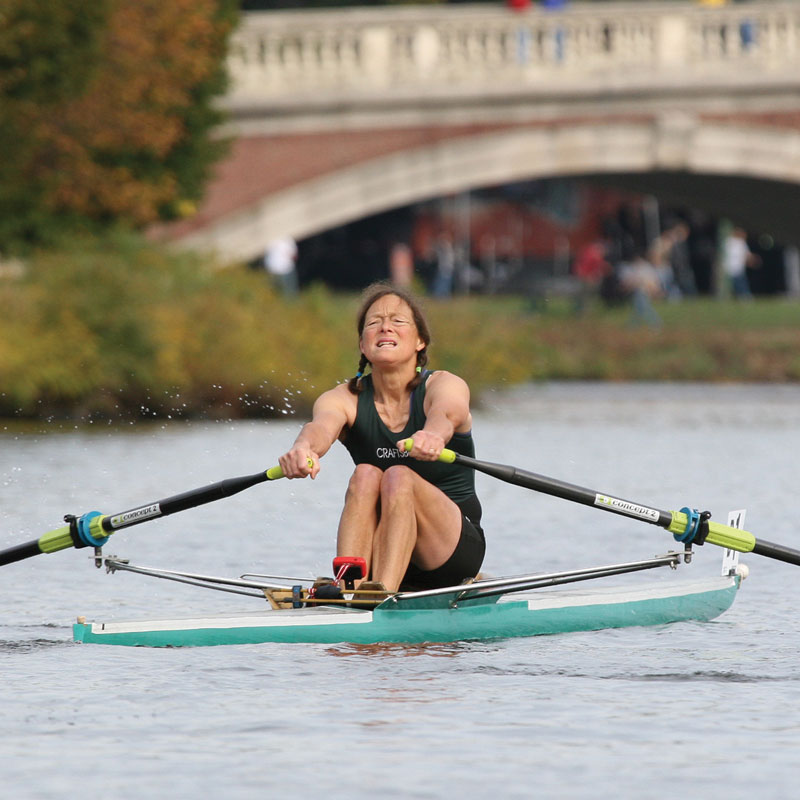
I First Knew I Was a Good Athlete: On long hiking trips, I would beat some of the guys. That may sound odd, but that was really like, “Whoa. I’m a strong person. I’m a strong athlete.”
Career Highlight: Making that very first Olympic team in 1976. I had come from sort of a total unknown. That was a thrilling voyage of discovery.
Career Lowlight: When it was time for my rowing career to end and having a somewhat rough time in the 1984 Olympics. I’d been doing it for nine years, and it was time to move on.
Best Coach: Larry Gluckman, who always had these words of wisdom: “Nothing works unless you do. Always leave the place better than you found it.” Just so thoughtful, and he really trusted you as an athlete and guided you to be a good person as well as a good athlete.
Being a Female Athlete at Dartmouth: I felt more welcome in the world of athletics than in some of the rest of life on campus. While Dartmouth was not offering totally equal opportunities in athletics for women in those early days, it was very welcoming and trying to move in the right direction.
Best Advice I Ever Got: You don’t have total control over what’s going to happen in the end, so you’ve just got to make the most of the process and enjoy it.
Toughest Opponent: The one I was going for in each race, the one I was going to catch.
How I Dealt with the Agony of Defeat: I had to figure out how to move forward. I couldn’t wallow in agony. I figured out what I could do differently next time.
My Favorite Stat: I’m proud to say I was on three Olympic teams. I was proud to win the Head of the Charles for quite a few years and set some records, but they’ve probably all been beaten by now.
Where I Keep My Awards: Right now they’re in a lot of boxes. I’m trying to figure out where to keep them.
Geer, an ecology major, lives in Craftsbury, Vermont. She works for Concept2 and helps run the Craftsbury Outdoor Center.
JIM SAPIENZA ’85
Distance Runner
Six-time All-American and four-time Ivy Player of the Year/three-time Watson Trophy winner
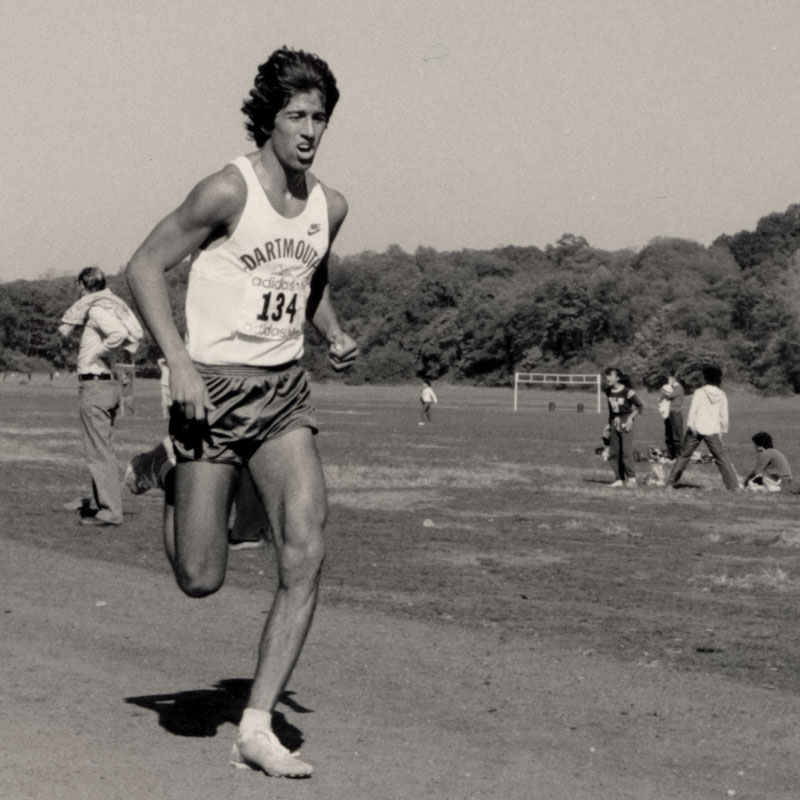
I First Knew I Was a Good Athlete: When I was in the third grade. I ran the 600-yard run as a part of the presidential fitness contest. I ran 1:58 and was the second-fastest runner in the entire grade school, up through the sixth-graders. One sixth-grader ran faster than me.
Career Highlight: A 5,000-meter race at Dartmouth, my freshman year when I was second to my senior teammate, Keith Hampton ’82. Keith and I had practiced running under two minutes for the final 800 meters of a 5K. We executed that on the Dartmouth track, where he finished first and I followed in second. When he turned and saw me right behind him, he couldn’t believe it.
Career Lowlight: Having to deal with a chronic hip alignment issue that created sciatica in my left leg. That limited my training, and that limited my successful racing as a postgraduate and, ultimately, led to my retiring after seven years.
Best Coach: Vin Lananna trained me through not just my four years at Dartmouth but also through the 1988 Olympic trials. Our relationship was a partnership. We each learned things about my physiology and my mental approach to racing, and he learned a lot from me being his first Division I All-American and national-caliber athlete. He tried out certain training and racing techniques with me, and that made him a better coach.
Toughest Opponent: Ed Eyestone from Brigham Young University. Even though he won the 10K outdoor championship in 1985, he told me afterward, “That was one of the hardest races I ever ran. I ran like a scared rabbit.”
How I Dealt with Jitters: By having a good pre-race routine that I still follow today at almost 60. That routine starts about 24 hours before race time and includes preparing my jersey and shoes and doing something relaxing the night before. And then I have a very routine 90 minutes before starting, which includes stretching, lacing my shoes, and being ready to go 10 minutes before the race.
How I Dealt with the Agony of Defeat: If I’d gotten beaten, Coach Lananna would say that I took it out on the workouts and, sometimes, my fellow training partners during the week. Lananna would say, “Jim, I know you’re upset, but can you back off a bit?”
Interesting Fact About My Trophies: I have three Alfred Watson trophies. The trophy is a large silver bowl. After two large silver bowls, they said, “Do you want a third silver bowl? Or would you prefer to have a mug?” So there’s a small mug for senior year and two huge bowls.
Motto: “A little bit better every day.”
Sapienza, an English major, is a healthcare executive. He lives in Santa Clarita, California.
JAY FIEDLER ’94
Quarterback
NFL (1994-2008)/Ivy Player of the Year/two-time Watson Trophy winner
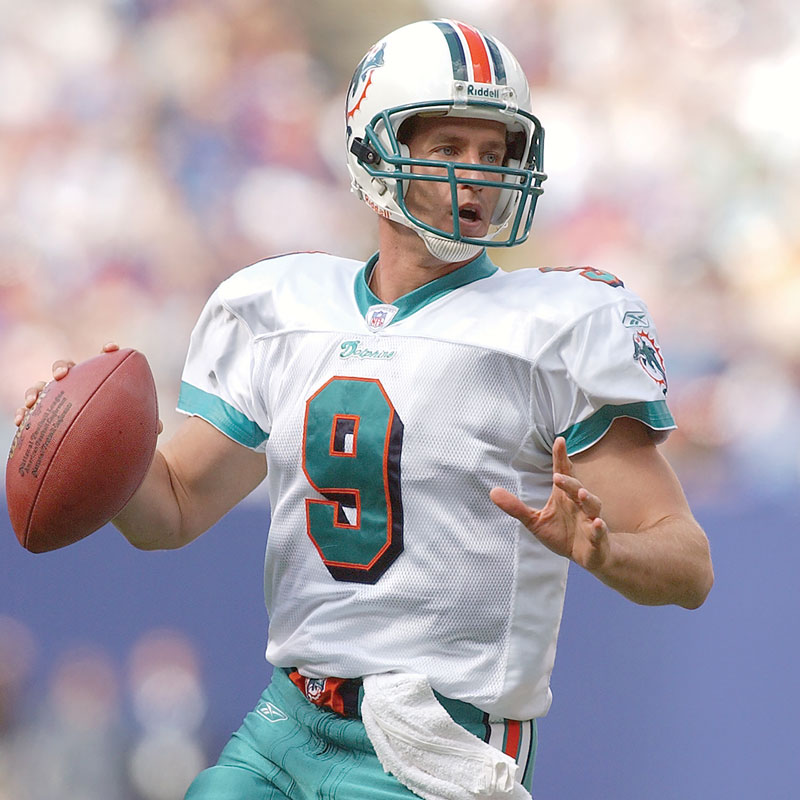
I First Knew I Was a Good Athlete: I started running cross country at age 5—half-mile races and such—and ended up competing in a race held during the national championships in Van Cortlandt Park in the Bronx. I won my age group, 5 years old.
Career Highlight: Winning the playoff game in 2000 against the Indianapolis Colts, my first year as a starting quarterback with the Miami Dolphins. We ended up coming back from a first-half deficit and scored the tying touchdown with about 15 seconds left on the clock. We won in overtime.
Career Lowlight: The “Monday Night Miracle.” I get reminded of it every year when they start off Monday nights, because they always play highlights of that game when the Jets were down 23 points and came back in the fourth quarter and ended up beating us in overtime.
Best Coach: Tom Coughlin. Played for him for one year in Jacksonville. He got a team as prepared as any coach I’ve ever been around.
Toughest Opponent: When I was playing for the Dolphins in the early 2000s, we had to go up against the New England Patriots twice a year. The defense they had back then was as tough as it gets.
Advice for Aspiring Athletes: Enjoy what you’re doing. Enjoy the work, enjoy the grind that it takes to improve. If you’re only having fun on game day, then you’re not going to get any better.
How I Dealt with the Agony of Defeat: If you put everything you had into the competition, then losing is just part of the game, and you learn from it. I used to hear from one of my coaches, “You’re either winning or you’re learning.” I was very good at putting things behind me and moving on and staying focused on the task at hand—the next play, next quarter, next game, whatever is coming up next.
Motto: My high school coach always sent me a little poem, “Don’t Quit,” which talks about staying persistent and moving forward and persevering through any challenges. That’s one I always go back to.
Fiedler, an engineering sciences major, lives in Garden City, New York. He runs Prime Time Sports Camps.
JACQUE (WEITZEL) STAHL ’00
Lacrosse Midfielder
Three-time All-American/Ivy Player of the Year
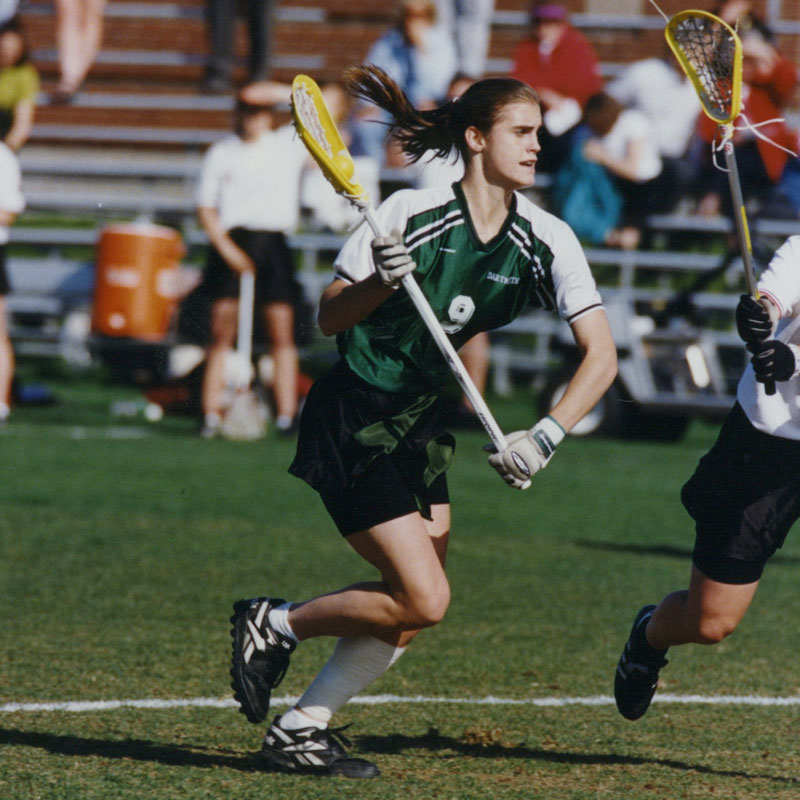
I First Knew I Was a Good Athlete: My junior year in high school, when I won the Heather Lee Albert MVP award out of all the players at an all-star team tournament. I remember thinking, “Maybe I’m okay, maybe I’m just really hard on myself.”
Career Highlight: Getting all the way to the NCAA semi-finals in 1998.
Career Lowlight: Losing that same game to the University of Virginia. I remember being devastated at the end for getting so close, but also elated that we had gotten to the Final Four.
Best Advice I Ever Got: Stop crying after you lose a game. That stopped in middle school, but my parents would say, “All right, Jacque, you gotta pull it together.” Maybe they were thinking, “It’s not just about you. You’re not the only one who lost.”
Toughest Opponent: Prince-ton. At Dartmouth it was always our biggest game. We always left everything out on that field. Thankfully, all four years, Dartmouth won, so it’s a fond memory.
Advice for Aspiring Athletes: Try to play multiple sports before you settle on one. You’re going to have to focus so hard on one sport in college, so if you’ve already focused in middle school and high school, I can’t imagine the burnout at that point.
Superstitions: I didn’t have them. It’s kind of fun to have them, but if you don’t do it right or if you’re not wearing the right headband, you’re going to psych yourself out and start off on the wrong foot.
Favorite Stat: Most caused turnovers—62 in 2000—because it’s doing two things at once: taking the ball away from the other team and getting the ball back onto our offensive side. It shows that I wasn’t just an attacker and a scorer. I actually played defense and did something else that was valuable.
Where I Keep My Awards: My home office. I have all my Ivy League First Team certificates. I also have the ball from my last lacrosse game in a box that my dad made. Etched into the base and all four sides are these records that I had. I look at that and think about things I want to do, and I think, “I can do it. I can do anything.” They inspire me.
Stahl, an English major, lives in Bethesda, Maryland, and works as a veterinarian.
ADAM NELSON ’97
Shot Putter
Three-time Olympian (2000, 2004, 2008) and silver and gold medalist/two-time All-American/NCAA champion (1997)/two-time Watson Trophy winner
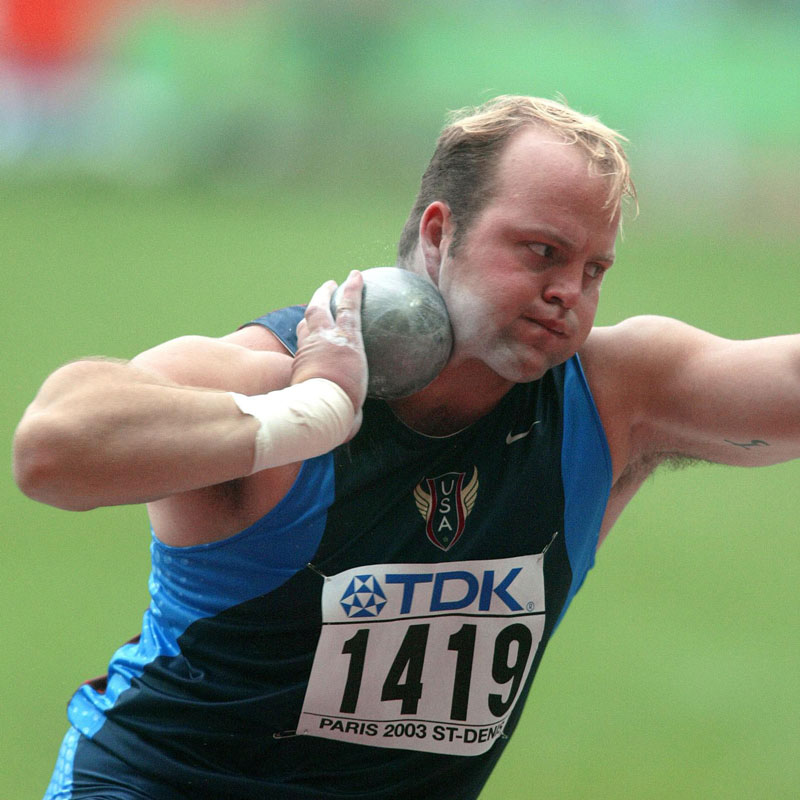
Career Highlights: The first time I made the Olympic team, in 2000, as was the world championship victory in 2005 and being able to make the team when I was a full-time grad student in 2008.
Career Lowlight: The way the 2004 Olympics transpired. I walked out of the Games with the silver medal in the tiebreaker and that was really heartbreaking. [In 2012 the IOC stripped the 2004 gold medal from Yuriy Bilonog of Ukraine for a drug violation]. Getting a gold medal in a food court at the Atlanta airport in 2013 was a high and a low.
Best Coach: High school wrestling coach Jim Glasser and Dartmouth track coaches Carl Wallin and Robert Weir. They all helped me push through different barriers.
Best Advice I Ever Got: I was fortunate in the 2000 Olympics to get to know now-Hall of Fame baseball manager Tommy Lasorda. On the Wednesday before I competed, he asked me, “How do you think you’re going to do?” I said, “I can only go out there and try my best.” I saw the blood boil up to his face, and this grandfather of a man started yelling at the top of his lungs, screaming, “Try? Losers try! Winners do!” He said that when you say you try, you are putting a disclaimer on the result. When you say you do your best, you go out there and do your best and that’s all you could ever do.
How I Dealt with the Agony of Defeat: I would come home and do about 36 hours straight of heavy manual labor in the yard.
How I Dealt with Jitters: Ninety percent of the game, once you achieve a certain level of physicality, is mental. I worked with sports psychologists, sports therapists, neuro-linguistic programming practition-ers, visualization specialists—anybody I felt I could learn something from to get a bit of an edge.
Favorite Stat: My jumping ability, which people didn’t necessarily associate with me. At the Sydney Olympics I did 39 1/2 inches on the vertical jump. I was pretty consistently over 12 feet for standing broad jump. I once beat Dwight Phillips in a standing broad jump, and he’s a four-time world champion in the long jump.
Nelson majored in government. He is athletic director at the Lovett School in Atlanta.
KRISTIN LUCKENBILL ’01
Soccer Goalkeeper
Olympian (2004) and gold medalist/U.S. women’s national soccer team (2004)/played in WUSA and WPS (2001-10)/three-time All-American and Ivy Player of the Year/Class of 1976 Award winner
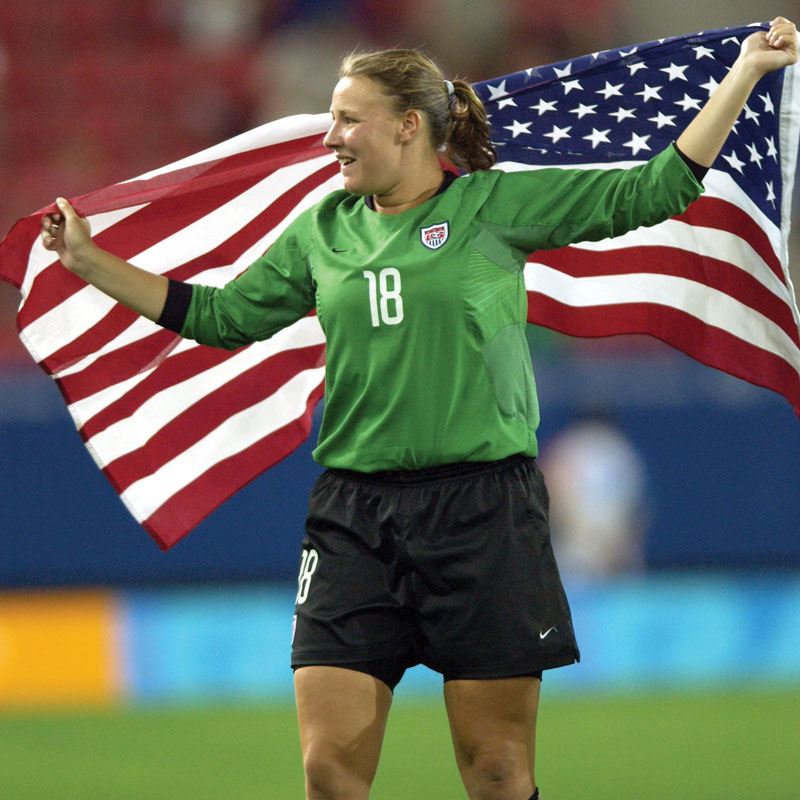
I First Knew I Was a Good Athlete: When my grandmother took me to a softball tryout when I was 8. It was supposed to be for 9- to 12-year-olds, and I was just knocking the ball out of the gym. I broke a couple of windows. The people at the tryout were like, “Who is this kid?”
Career Highlight: Winning the Founder’s Cup in the WUSA, our first women’s professional soccer league, in 2002. The year prior, my team [the Carolina Courage] had come in dead last. We made a ton of changes in the offseason and were able to put together a really strong team.
Career Lowlight: Not making the final cut of the 2008 Olympic team. It was crushing.
Best Coach: Erica Walsh at Dartmouth, who also coached our national team. She has this calm confidence that makes everybody trust her and want to work hard for her.
Best Advice I Ever Got: I had a coach in middle school who said, “If you want to do something with soccer and be really successful, you should commit to being a goalkeeper.” I actually listened. That’s the remarkable part. You can’t always choose what you’re good at.
Toughest Opponent: We always wanted to beat Harvard. That was the game we looked forward to playing every year, and I think we almost always won.
Being a Female Athlete at Dartmouth Was: Empowering. I found it gave me tremendous confidence and the best group of friends I could imagine.
How I Dealt with Jitters: I rarely got nervous. I had a little bit of a pregame routine, such as listening to the same music—Pink Floyd—before every game or doing the same thing before getting to the locker room.
Favorite Stat: The best stat that we have is shutouts. But I don’t see that as just a goalkeeping stat. That’s a full team effort.
Motto: I like the Thomas Jefferson quote, “I’m a great believer in luck, and I find the harder I work the more I have of it.”
Luckenbill, a geography major, is a management consultant. She lives in Colorado and New Jersey.
